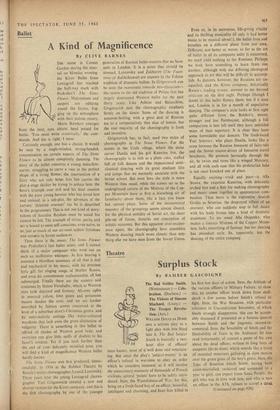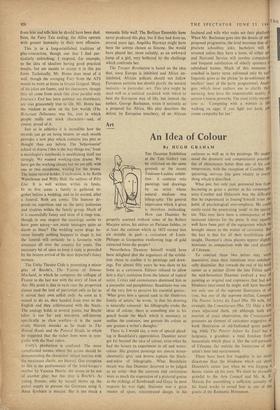Theatre
Surplus Stock
By BAMBER GASCOIGNE
WILLIAM DOUGLAS HOME
sees a serious play as a light play with bits fitted into it. The Bad Soldier Smith is basically a two- hour slice of officers' mess banter, most of it well done and entertain- ing. But since the play's 'subject-matter' is an officer's refusal in war-time to obey an order which he considers immoral, as it will involve the unnecessary massacre of thousands of French civilians, several 'points' have to be subtly intro- duced. Item, the Wastefulness .of War; for this, bring on a fresh-faced boy of an officer, beautiful, intelligent and charming, and have him killed in his first few days of action. Item, the Attitude of the various officers to Military Failure; to show this, let another officer break down from shell- shock a few scenes before Smith's refusal to fight. Item, the War Situation, with particular reference to Unconditional Surrender, of which Smith strongly disapproves; this can be accept- ably discussed if presented as a furious quarrel between Smith and the jingoistic second-in- command. Item, the Sensibility of Smith and the Desirability of Tears in the Audience; let him read (reluctantly, of course) a poem of his own about the dead officer, written in long lines of anapaests (de-de-dum), which sounds like a troop of mounted mourners galloping in slow motion over the green grass of the boy's grave. Item, the Type of Reaction which Smith, having been court-martialled, cashiered and sentenced to a year in gaol, can expect from Some People; the girl who was in love with him, and who is now an officer in the ATS, refuses to accept a drink
(Continued on page 920)
from him and tells him he should have been shot. Item, the Fairy Tale ending; the Allies operate with greater humanity in their next offensive.
This is in a long-established tradition ' of play-concoction, though one that I find par- ticularly unfetching; I respond, for example, to the idea of idealism having good practical results, but am unable to accept it in this pat form. Technically, Mr. Home does most of it well, though the avenging Fury from the ATS would be more at home in Grand Guignol. Many of his jokes are funny; and his characters, though they all come from stock (the close parallel with Journey's End has been pointed out elsewhere), are also gruesomely true to life. Mr. Home has the wisdom to seize on the few worlds (The Reluctant Debutante was his, too) in which people really are stock characters—and, of course. proud of it.
Just as in athletics it is incredible how the records can go on being beaten, so each month provides a new play which contains less plot or thought than any before. The 'behaviourist' school of drama (`this is the way things are,' from a sociologist's notebook) is establishing itself too strongly. We wanted working-class drama. We have got the working classes but we are still, with one or two exceptions, waiting for the drama. The latest record-holder, Celebration, is by Keith Waterhouse and Willis Hall, the authors of Billy Liar. It is well written within its limits. In its first scene a family is gathered to- gether before a wedding, and in its second, after a funeral. Both are comic. The humour de- pends on repetition and on the petty jealousies and rivalries within the family group. Much of it is successfully funny and most of it rings true, though in one respect the sociology seems to have gone astray—are many teenagers quite so dumb as these? The wedding scene drags be- cause literally nothing happens to shape it, but the funeral will certainly be a favourite with amateurs all over the country for years. The necessary bit of spice to keep it tasty is provided by the brazen arrival of the dear departed's fancy woman.
The Unity Theatre Club is presenting a minor play of Brecht's, The Visions of Simone Machard, in which he compares the collapse of France in the last war with the story of Joan of Arc. His point is that in each case the propertied classes used the tool of patriotism only so far as it served their own selfish ends. As soon as it ceased to do so, they handed Joan over to the English and they collaborated with the Nazis. The analogy holds at several points, but Brecht takes it too far and interprets self-interest specifically as class warfare—it is the same crude Marxist mistake as he made in The Round Heads and the Pointed Heads, in which he suggested that the richer Jews were in sym- pathy with the Nazi rulers.
Unity's production is confused. The more complicated scenes, where the actors should be demonstrating the characters' mixed motives with the maximum clarity, are blurred. One exception to this is the performance of the hotel-keeper's mother by Vanessa Harris; she seems to be out of another play; but that play is Brecht's. As young Simone, -who by herself blows up the petrol supply to prevent the Germans using it, Anna Kashden is miscast. She is too much a romantic little waif. The Berliner Ensemble have never produced this play, but if they had done so, several years ago, Angelika Hurwicz might have been the actress chosen as Simone. She would have played her, more suitably, as an awkward lump of a girl, very bothered by the challenge which confronts her.
The Tresper Revolution is based on the idea that, since Europe is inhibited and Africa un- inhibited, African policies should not follow European patterns but should glorify the natural instincts—in particular, sex. This idea might be used well as a satirical yardstick with which to beat the European way of life, but instead the author, George Buchanan, treats it seriously as a proposal for Africa. His play describes the defeat, by European treachery, of an African husband and wife who make sex their platfor When Mr. Buchanan goes into the details of the. proposed programme, the level becomes that of prurient schoolboy joke; bachelors will arrested unless they have a lover, of either se and National Service will involve compulso and frequent satisfaction of elderly spinsters i subsidised homes. Much of this nonsense couched in heavy verse, enlivened only by such linguistic gems as the phrase `to de-sublimate tb1 intellect' (part of the party programme). Analo gies. which most authors use to clarify their meaning. here have the impenetrable quality of certain Chinese proverbs. The most richly myster ious is: 'Competing with a woman is like walking on eggs; if you light too hard, you create sympathy for her.'



































 Previous page
Previous page